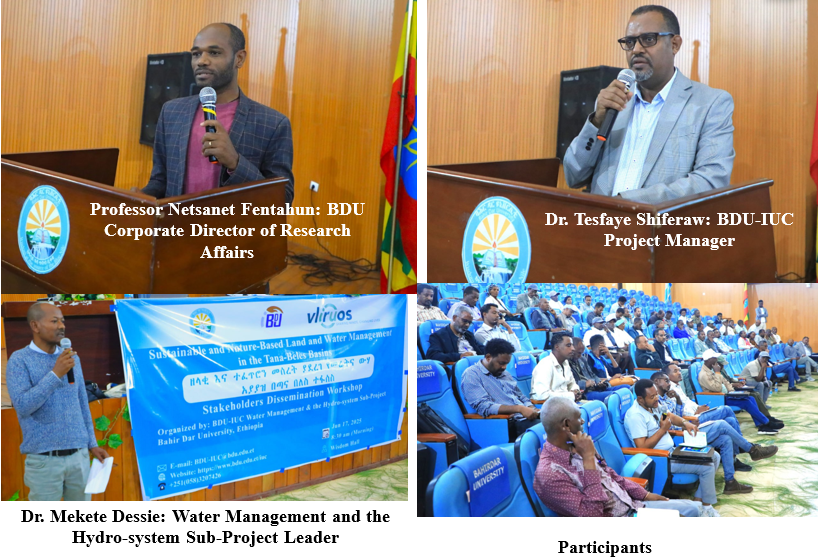
Sustainable and Nature-Based Land and Water Management in the Tana-Beles Basins
Wisdom Hall
16 Jun, 2025
The BDU-IUC Phase II of Water Management and the Hydro-system sub-project hosted a successful, comprehensive stakeholder dissemination workshop. This engaging event is designed to bring together a diverse range of participants, including Farmers, Kebele level development agents, Woreda-level experts, Amhara Water and Energy Bureau, National Metrology Agency, ANRS Irrigation and Lowland Area Development Bureau, Abay Basin Authority, Bureau of Agriculture (BoA), ANRS Environment and Forest Protection Authority (EFPA), Amhara Water Works Construction Enterprise, Amhara Design and Supervision Works Enterprise, Amhara Agricultural Research Institute (ARARI), Koga Irrigation Association, BDU community like Director of the School of Geology, Vice Dean of Research and Community Engagement, Dean of Civil and Water Resources Engineering Faculty, Vice Dean of Research and Community Engagement from the Civil and Water Resources Engineering Faculty, Research and community engagement directors, BDU-IUC Subproject Leaders.
The primary objective of the workshop was to share and delve into the findings from Phase I of the PhD research, which investigates critical elements of water management and the intricate dynamics of the hydro-system. This event not only aimed to disseminate the insightful research results but also sought to cultivate a wealth of opportunities for collaboration, knowledge exchange, and the development of partnerships between the project team and various stakeholders. By fostering these connections, the workshop intends to amplify the project's impact on both water management practices and the conservation efforts related to the hydro-system.
Furthermore, government authorities at both local and regional levels are anticipated to play a critical role in these restoration initiatives. Their involvement is expected to be particularly significant, as they possess the capacity to mobilize resources, coordinate efforts, and facilitate collaboration among various stakeholders. In particular, strong support from environmental and natural resource management agencies is anticipated, as these organizations are equipped with the expertise and knowledge necessary to guide sustainable practices. Their engagement will not only serve to validate the research findings but also to ensure the implementation of effective and evidence-based strategies for sustainable water resource management. This collaboration will be essential in developing policies that address both current challenges and long-term sustainability goals, thereby fostering a resilient ecosystem that can adapt to changing environmental conditions.
